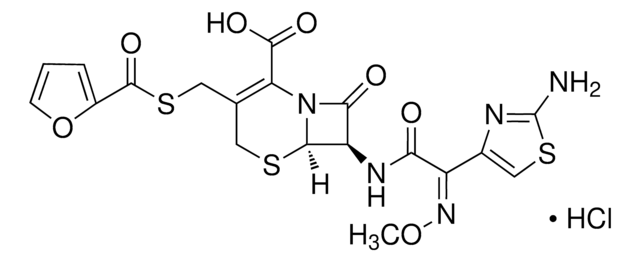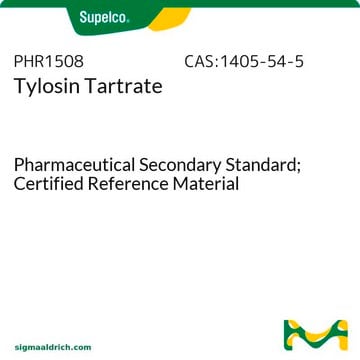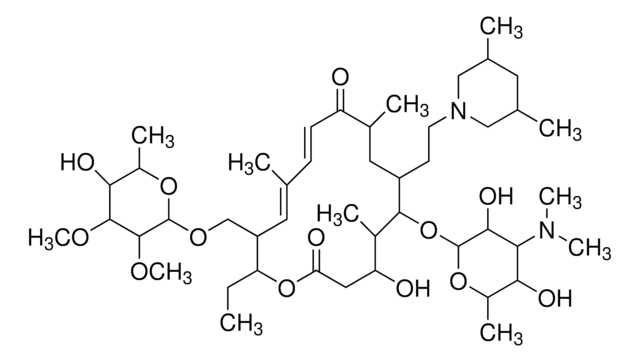F1427
Florfenicol
analytical standard, for drug analysis
Synonyme(s) :
Aquafen, Nuflor, SCH-25298, [R-(R*,S*)]-2,2-Dichloro-N-[1-(fluoromethyl)-2-hydroxy-2-[4-(methylsulfonyl)phenyl]ethyl]acetamide
About This Item
Produits recommandés
Qualité
analytical standard, for drug analysis
Niveau de qualité
Forme
solid
Technique(s)
HPLC: suitable
gas chromatography (GC): suitable
Application(s)
forensics and toxicology
pharmaceutical (small molecule)
veterinary
Format
neat
Chaîne SMILES
CS(=O)(=O)c1ccc(cc1)[C@@H](O)[C@@H](CF)NC(=O)C(Cl)Cl
InChI
1S/C12H14Cl2FNO4S/c1-21(19,20)8-4-2-7(3-5-8)10(17)9(6-15)16-12(18)11(13)14/h2-5,9-11,17H,6H2,1H3,(H,16,18)/t9-,10-/m1/s1
Clé InChI
AYIRNRDRBQJXIF-NXEZZACHSA-N
Vous recherchez des produits similaires ? Visite Guide de comparaison des produits
Description générale
Application
- To measure florfenicol and its main metabolite florfenicol amine in tilapia meat by solid phase extraction (SPE) and ultra high-performance liquid chromatography-tandem mass spectrometry (UHPLC-MS/MS)
- Multi-residue analysis of three amfenicols in animal feed samples by HPLC-MS/MS method, following European Commission Decision 2002/657/EC(2)Determination of florfenicol in different animal feedstuff samples by thin layer chromatography (TLC) coupled with HPLC-UV detection
- Residue analysis of florfenicol in broiler meat and liver samples by a reversed phase-HPLC method in combination with UV detection at 223 nm
- Competitive indirect-chemiluminescent enzyme-linked immunosorbent assay (CL-ELISA) based quantitative analysis of florfenicol and its major metabolite florfenicol amine in chicken muscle samples, validated as per Commission Decision 2002/657/EC
Autres remarques
Mention d'avertissement
Danger
Mentions de danger
Conseils de prudence
Classification des risques
Aquatic Acute 1 - Aquatic Chronic 1 - Repr. 2 - STOT RE 1
Organes cibles
Liver,Brain,Testes,Spinal cord,Blood,gallbladder
Code de la classe de stockage
6.1C - Combustible acute toxic Cat.3 / toxic compounds or compounds which causing chronic effects
Classe de danger pour l'eau (WGK)
WGK 3
Point d'éclair (°F)
Not applicable
Point d'éclair (°C)
Not applicable
Équipement de protection individuelle
Eyeshields, Gloves, type N95 (US)
Faites votre choix parmi les versions les plus récentes :
Déjà en possession de ce produit ?
Retrouvez la documentation relative aux produits que vous avez récemment achetés dans la Bibliothèque de documents.
Les clients ont également consulté
Notre équipe de scientifiques dispose d'une expérience dans tous les secteurs de la recherche, notamment en sciences de la vie, science des matériaux, synthèse chimique, chromatographie, analyse et dans de nombreux autres domaines..
Contacter notre Service technique

















